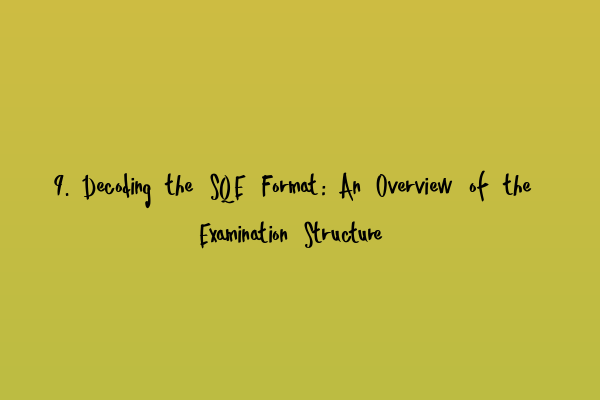Decoding the SQE Format: An Overview of the Examination Structure
The Solicitors Qualifying Examination (SQE) is a major milestone on the journey to becoming a qualified solicitor in England and Wales. With its introduction in 2021, aspiring solicitors will need to understand the intricacies of the SQE format to prepare effectively for the exam. In this article, we will decode the SQE format, offering a comprehensive overview of the examination structure to help you navigate this new qualification process.
1. Introduction to the SQE
The SQE is divided into two stages: SQE1 and SQE2. SQE1 tests your functioning legal knowledge across various areas of law, while SQE2 focuses on assessing your practical legal skills. Before diving into the details of each stage, let’s take a closer look at what they entail.
SQE1
SQE1 consists of two papers: SQE1 Part 1 and SQE1 Part 2. Both papers consist of multiple-choice questions (MCQs) that assess your ability to apply legal principles and solve problems. SQE1 Part 1 covers legal research, legal writing, and legal drafting, while SQE1 Part 2 tests your knowledge of business law and practice, dispute resolution, contract law, criminal law and practice, property law and practice, and wills and the administration of estates.
If you’re looking to practice MCQs for SQE1, we highly recommend checking out our SQE 1 Practice Exam Questions. These practice questions will help you familiarize yourself with the format and gain confidence in your legal reasoning skills.
SQE2
SQE2 focuses on the practical skills necessary for a solicitor to succeed in practice. This stage consists of both oral and written assessments. SQE2 assesses your ability to interview clients, draft various legal documents, advocate in court, and correctly apply legal principles to practical scenarios.
To prepare for the practical assessments of SQE2, our SQE 2 Preparation Courses will give you the necessary training and guidance to excel in this stage of the examination.
2. Understanding the Examination Structure
Now that we have an overview of SQE1 and SQE2, let’s delve into the examination structure of each stage to better understand what awaits you during the exam.
Structure of SQE1
SQE1 Part 1 consists of 180 MCQs, while SQE1 Part 2 consists of 120 MCQs. These MCQs are designed to assess your applied legal knowledge across various practice areas. It is important to note that SQE1 is a computer-based examination, enabling efficient delivery and grading of the assessments.
If you’re looking to simulate the SQE1 examination environment, our SQE 1 Practice Mocks FLK1 FLK2 will replicate the real exam conditions, giving you a valuable insight into what to expect during the actual assessment.
Structure of SQE2
SQE2 consists of 16 practical assessments designed to evaluate your ability to effectively apply legal knowledge to practical scenarios. These assessments cover areas such as client interviewing and advising, case and matter analysis, advocacy, legal research, drafting, and writing. SQE2 assessments are conducted through a combination of oral and written methodologies.
3. Key Dates and Exam Preparation
As you embark on your SQE journey, it is crucial to keep track of important dates and plan your preparations accordingly. The SRA provides a comprehensive list of SRA SQE Exam Dates to help you stay organized and ensure you’re fully prepared for the assessments.
To maximize your chances of success in the SQE, thorough exam preparation is essential. Enrolling in comprehensive SQE 1 Preparation Courses will equip you with the knowledge, skills, and practice necessary to confidently tackle the exam. Additionally, our SQE 2 Preparation Courses will provide you with the practical training required to excel in the second stage of the qualification process.
4. Conclusion
The SQE format can initially seem daunting, but with a clear understanding of the examination structure and thorough preparation, you can successfully navigate the qualification process. By familiarizing yourself with the content, format, and key dates of the SQE, you can confidently approach the exams and work towards achieving your goal of becoming a qualified solicitor.
